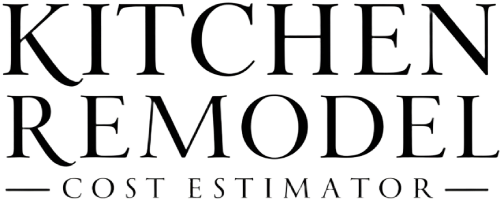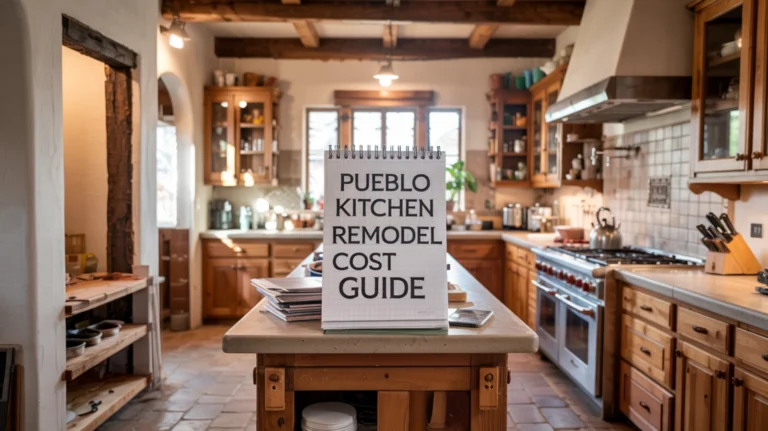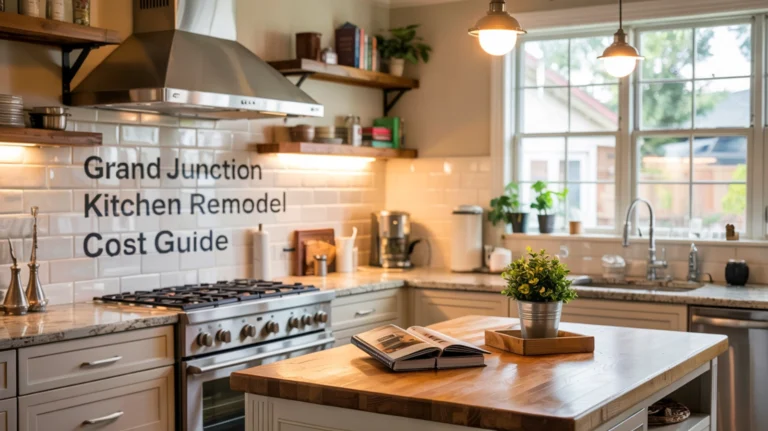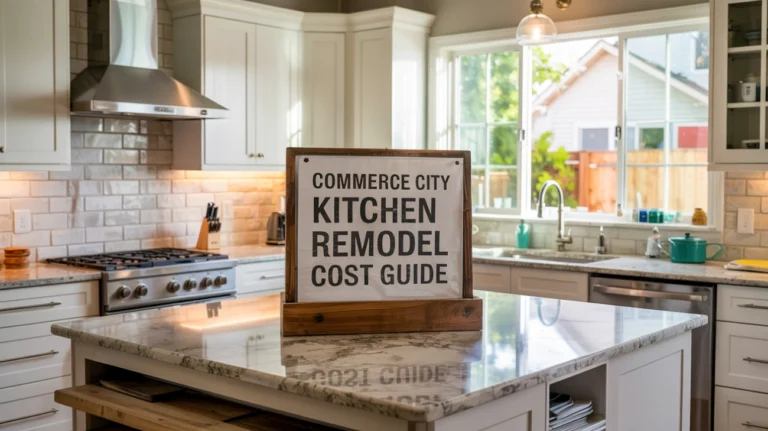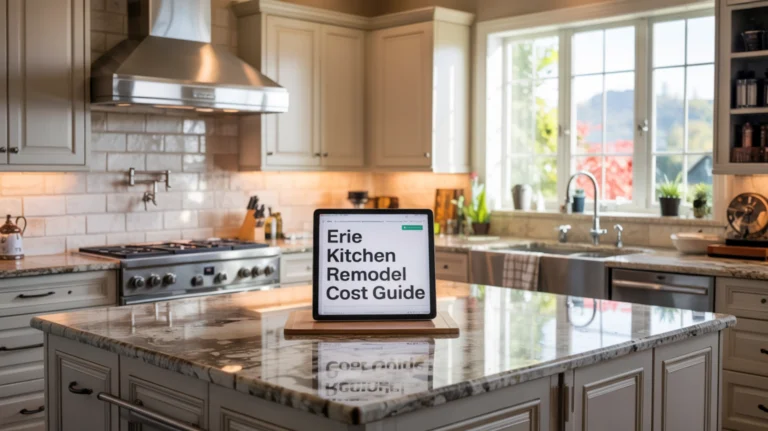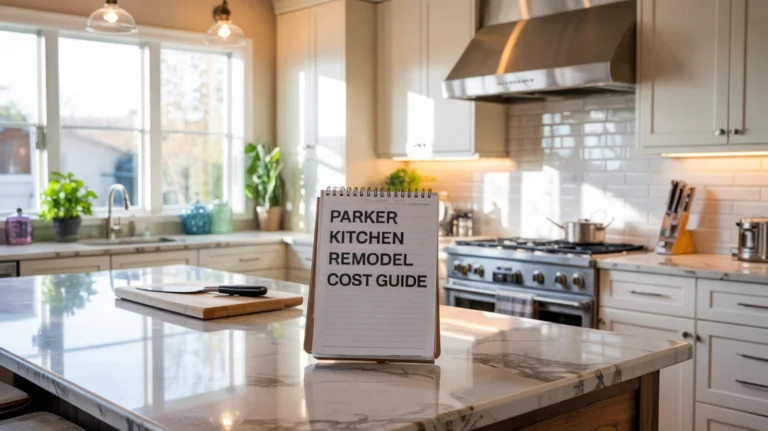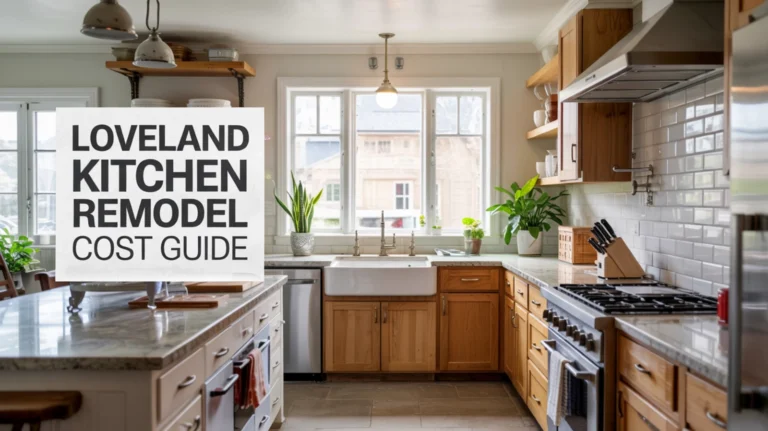Planning a kitchen remodel in Thornton means navigating a complex web of costs that vary dramatically based on your choices. From cabinet quality to labor rates, each decision cascades into your final price tag, creating a range wider than the Front Range views. The local market has its own quirks too, with Denver-area costs often trending higher than national averages for similar work.
So what will that dream kitchen actually cost you here in Thornton?
The average kitchen remodel cost in Thornton, Colorado ranges from $14,000 to $40,000. Smaller projects with basic updates may start at $10,000, while premium remodels featuring custom cabinets, new flooring, and high-end appliances can exceed $55,000 based on materials and labor rates.
Kitchen Remodel Cost Estimator for Thornton
Thornton Kitchen Remodel Cost Calculator
Get an estimate for your kitchen renovation based on your specifications.
Estimated Kitchen Remodel Cost
This estimate is based on national averages and may vary based on your location, material availability, contractor rates, and other factors. Prices are estimates only and should be used for planning purposes.
Looking for more accurate costs in your area? Search for location-specific remodel costs.
Kitchen Remodel Cost Ranges in Thornton, CO
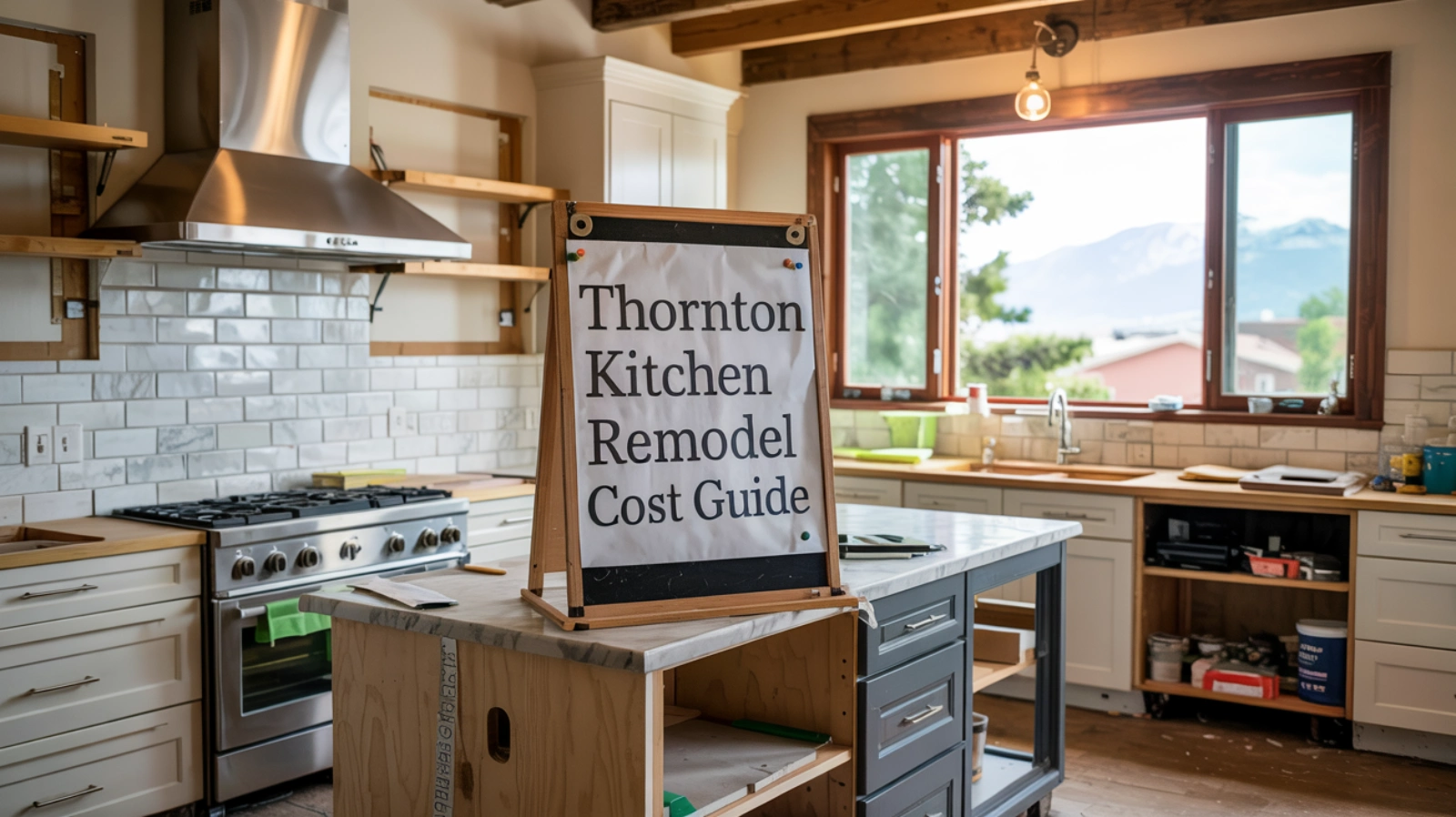
Overall Project Cost Estimates
Dreaming of a kitchen transformation in Thornton, Colorado? Before you start picking out countertops and cabinets, let’s talk numbers.
What will your vision actually cost? It’s a question with an answer that varies wildly depending on your ambitions and choices.
For homes in the Denver metro area (which includes Thornton), you’re looking at average costs between $12,800 and $21,200 — breaking down to about $100 to $250 per square foot. Local renovation companies offer everything from $15,000 basic refreshes to $50,000+ high-end transformations.
But what do these numbers really mean?
National benchmarks help put things in perspective. A minor remodel typically runs around $24,000, while major renovations jump to $69,000. Going all-out with an upscale project? That’ll set you back about $136,000 on average.
Denver-area builders often categorize their work differently:
- Replacement projects (starting over $60,000)
- Semi-Custom renovations (starting over $80,000)
- Custom kitchen transformations (starting over $125,000)
These higher starting points suggest Colorado homeowners might need to budget a bit more than the national average.
Kitchen size plays a huge role in your final price tag. Colorado-specific estimates break it down like this:
- Small kitchens (70-100 sq ft): $20,000 to $50,000+
- Medium kitchens (100-200 sq ft): $40,000 to $75,000+
- Large kitchens (200+ sq ft): Often exceeding $100,000
Denver-specific breakdowns offer similar tiers: Basic ($7,000-$10,000), Mid-Range ($11,000-$25,000), and High-End ($38,000-$150,000+).
National cabinet suppliers and remodeling platforms suggest averages between $14,607 and $40,616, with most projects landing around $26,268. Other sources estimate ranges from $25,000 to over $150,000.
The widely respected Cost vs. Value Report (2024) provides these national averages:
- Minor Midrange remodel: $27,492
- Major Midrange remodel: $79,982
- Major Upscale remodel: $158,530
A Denver-based remodeler estimates typical kitchen projects between $70,000 and $150,000+. Some 2023 data suggested a national average around $26,790, with budget remodels from $12,500-$30,000, mid-range from $30,000-$80,000, and high-end from $80,000-$160,000.
So what’s the bottom line for Thornton kitchens?
Synthesizing all these figures, a basic or minor kitchen remodel in Thornton typically ranges from approximately $13,000 to $30,000. Mid-range projects generally span $30,000 to $80,000. Major renovations, particularly those involving high-end materials or custom work, frequently start above $80,000 and can extend well beyond $150,000.
The considerable overlap in cost categories underscores a key point: terms like “minor,” “mid-range,” and “major” don’t have standardized definitions. Different sources employ varying criteria. A “minor” remodel might include cabinet refacing, new appliances, countertops, sink, flooring, and paint costing $24,000, while a “basic” $7,000-$10,000 project might only involve refreshing existing elements like painting cabinets.
What does this mean for your budgeting? Focus on detailed, itemized quotes comparing specific work scopes and materials rather than relying on broad category labels. The actual project scope, including specific material choices and whether the layout changes, is a far more reliable cost driver than generalized labels.
Estimated Total Kitchen Remodel Cost Ranges (Thornton/Denver Area)
| Remodel Scope | Estimated Cost Range ($) | Key Included Features (Examples) |
|---|---|---|
| Minor / Basic | $13,000 – $30,000 | Cabinet refacing/painting, entry-level cabinets, updated hardware, new countertops (laminate/basic stone), basic appliances, paint |
| Mid-Range | $30,000 – $80,000 | New semi-custom cabinets, higher-quality countertops (quartz/granite), new energy-efficient appliances, island, new flooring, lighting |
| Major / Upscale / Custom | $80,000 – $150,000+ | Custom cabinetry, high-end countertops/appliances, layout changes (moving walls/plumbing), custom lighting, premium flooring |
Cost Per Square Foot Benchmarks
When planning your Thornton kitchen remodel, cost per square foot gives you a standardized way to compare options and budgets. But these numbers fluctuate dramatically based on how extensive your renovation will be.
General estimates for the area range from $100 to $250 per square foot. But Denver-specific data suggests you might need to budget higher—typically $190 to $375 per square foot.
Why such a big difference? One local contractor breaks it down further: expect to pay $190-$240 per square foot when using store-bought cabinets, but that jumps to $300-$375 per square foot with custom cabinets.
Looking for a more budget-friendly refresh? Lower-end figures around $75 per square foot usually reflect cosmetic updates only.
National ranges provide additional context, with estimates from $75-$250 per square foot. General rules of thumb suggest $100-$150 per square foot for standard materials, climbing to $450+ for premium finishes.
So what should you budget in Thornton?
Taking all these figures into account, typical costs per square foot for kitchen remodels in the Thornton/Denver area span approximately $100 to $375. The lower end ($75-$150/sq ft) generally covers cosmetic changes or the use of standard, stock materials. Higher values ($190-$375+/sq ft) indicate more substantial renovations with higher quality materials (like custom cabinets), significant layout alterations, and potentially complex modifications to plumbing and electrical systems.
This wide variation isn’t arbitrary—it directly reflects how intense and complex your renovation will be. Basic updates like painting or hardware changes naturally cost less per square foot compared to projects involving wall removal, plumbing relocation, or high-end custom components.
The stark distinction provided by one contractor, where choosing between store-bought and custom cabinets alone accounts for a difference of roughly $110-135 per square foot, perfectly illustrates this relationship. Cost per square foot serves as an indicator of the depth of your remodel; higher values mean more invasive, complex work affecting materials, labor intensity, and potentially triggering more extensive permit requirements.
While total project cost inevitably increases with kitchen size, the cost per square foot has a more complex relationship. In theory, larger kitchens could benefit from economies of scale, spreading fixed costs (like design fees or contractor overhead) over a larger area, potentially reducing the per-square-foot cost.
However, real-world data suggests that larger kitchens often correspond to higher-value homes where owners opt for premium materials, sophisticated designs, and complex features like large islands or custom installations. This tendency toward higher-end finishes in larger spaces can counteract or even outweigh economies of scale, sometimes leading to an equal or higher cost per square foot compared to smaller or mid-sized kitchens undergoing simpler renovations.
The interplay between size, material quality, and design complexity means cost per square foot is heavily influenced by the level of renovation chosen for a given space, not just the dimensions.
Kitchen Remodel Cost Per Square Foot Ranges (Thornton/Denver Area)
| Source/Scope Category | Cost Range ($/sq ft) | Notes |
|---|---|---|
| General Average (Local) | $100 – $250 | Broad average covering various scopes |
| General Average (Denver) | $190 – $375 | Higher range often cited for Denver market |
| Basic / Cosmetic | $75 – $150 | Primarily surface updates, stock materials |
| Mid-Range / Store-Bought Cabs | $190 – $240 | Includes standard new components, potentially minor layout changes |
| High-End / Custom Cabinets | $300 – $375+ | Includes custom work, significant layout changes, premium materials |
| National Average Range | $75 – $250 | Provides broader context |
Cost Breakdown by Category
%%{init: {'theme': 'neutral'}}%%
pie
title ...Typical Kitchen Remodel Budget Allocation
"Cabinets & Hardware" : 29
"Labor / Installation" : 15
"Appliances & Ventilation" : 15
"Countertops" : 10
"Flooring" : 6
"Lighting & Electrical" : 7
"Plumbing & Fixtures" : 5
"Backsplash" : 5
"Other" : 8Typical Allocation Percentages
Ever wondered how your kitchen remodel budget actually gets distributed? Understanding typical cost allocation gives you a framework for planning and reality-checking quotes.
Analyzing various sources reveals a consistent pattern in how budgets break down:
• Cabinets & Hardware: Consistently the largest expense, gobbling up approximately 29% of your total budget. One example breakdown allocated 28% ($8,400 of a $30k project).
• Labor / Installation: The second major cost category, typically ranging from 13% to 18%.
• Appliances & Ventilation: Generally consumes 14% to 17% of the budget.
• Countertops: Typically accounts for 10% to 11%.
• Flooring: Usually represents 5% to 7% of the total cost.
• Lighting & Electrical: Allocated around 5% to 10%.
• Plumbing & Fixtures (Sink/Faucet): Typically 4% to 6%.
• Backsplash: Often around 5%. (Sometimes included with countertops in breakdowns.)
• Other Categories: Walls/Ceilings (5%), Design Fees (4%), Doors/Windows (4%), Miscellaneous (1-5%).
Despite variations in overall project costs and potential regional differences, these proportions remain remarkably stable across different data sources. Cabinets consistently dominate, followed by labor/installation, then appliances and countertops.
Why such consistency? It comes from the inherent costs associated with these elements: cabinets involve substantial material, manufacturing, and installation expense; labor encompasses multiple skilled trades working over extended periods; appliances are significant individual purchases; and countertops require costly materials plus specialized fabrication and installation.
This consistency suggests that budget allocation strategies can be reliably based on these typical percentages, regardless of your project’s total scale.
One important note: comparing cost breakdowns requires attention to how “Installation” or “Labor” is treated. Some sources explicitly separate a general labor or installation category, typically representing 13-18% of the budget. Other analyses may implicitly bundle labor costs within individual component estimates (e.g., the cost of “installed” cabinets).
This difference in categorization methodology means that when reviewing contractor quotes or estimates, it’s crucial to clarify whether listed component costs (e.g., for cabinets or countertops) already include the associated installation labor or if there’s a separate, comprehensive labor/installation line item. Failure to clarify can lead to inaccurate budget comparisons, potentially resulting in double-counting labor or underestimating the total labor expense required.
Typical Kitchen Remodel Cost Allocation Percentages
| Cost Category | Average Percentage Range (%) | Notes |
|---|---|---|
| Cabinets & Hardware | 28% – 29% | Consistently the largest single expense category |
| Labor / Installation | 13% – 18% | May be listed separately or partially included in component costs |
| Appliances & Ventilation | 14% – 17% | Significant cost, varies greatly by brand and features |
| Countertops | 10% – 11% | Material choice is a major driver within this category |
| Flooring | 5% – 7% | Depends heavily on material selected and square footage |
| Lighting & Electrical | 5% – 10% | Includes fixtures and labor for installation/modification |
| Plumbing & Fixtures (Sink/Faucet) | 4% – 6% | Includes materials and labor for plumbing modifications/connections |
| Backsplash | ~5% | Material and complexity influence cost |
| Other (Paint, Drywall, Design, etc.) | 1% – 10% | Includes various finishing touches, fees, and potential demolition costs |
Estimated Costs for Key Components
Beyond percentage allocations, understanding typical dollar ranges for major components is essential for budgeting:
• Cabinets: Costs vary significantly by type. Stock cabinets range from $100-$300 per linear foot (LF) installed, semi-custom from $150-$650/LF, and custom from $500-$1,200/LF. Cabinet refacing offers a less expensive alternative, typically costing $7,000-$12,000 for the total project. Installation labor for cabinets can range from $1,200 to $8,500 depending on the project scale and cabinet type. An example breakdown showed cabinets at $8,400.
• Countertops: Material choice heavily influences cost (detailed in the Materials section below), ranging from $19/sq ft for laminate to over $200/sq ft for high-end stone. Installation costs add significantly, estimated between $1,900-$7,100 depending on project scale, or $30-$50/sq ft, or $40-$100/LF. An example project allocated $3,300 for countertops and backsplash.
• Appliances: The total cost can range from $200 for basic models to over $15,000 for high-end suites. Installation costs per appliance vary from $100-$900 depending on complexity and type, or $120-$280 per appliance. Energy Star certified appliances are recommended for long-term savings. A sample budget allocated $4,500 for appliances.
• Labor: General installation costs are estimated between $3,500-$6,000. A sample $30k remodel included $5,400 for labor/installation. Specific trade rates are detailed in the Labor Costs section.
• Flooring: Installed costs vary widely by material (detailed below). Installation labor ranges from $700-$3,900 or $1,520-$4,700. A sample project budgeted $2,100 for flooring.
• Permits: Costs in Thornton are based on project valuation (detailed in the Permitting section). A Denver example showed a $25k project incurring roughly $220 in permit fees plus review fees.
• Other Potential Costs: Lighting fixtures and installation ($1,500 example), plumbing work including sink/faucet ($900-$1,000 examples), backsplash installation ($590-$1,320), painting and drywall ($1,500 example), demolition and removal ($500-$3,000), design fees (approx. 4% or $900 example), and structural changes like wall removal ($300 for non-load-bearing, up to $3,000 for load-bearing).
It’s important to recognize that the costs associated with different remodel components are often interdependent.
For example, selecting high-cost custom cabinets typically necessitates higher installation labor costs due to complexity and precision requirements. Upgrading appliances might require modifications to existing electrical circuits or even panel upgrades, adding labor and potentially triggering permit reviews.
Similarly, changing the kitchen layout by moving walls or relocating sinks and appliances dramatically increases costs across multiple categories. Such changes involve demolition, potential structural work (requiring engineering and higher permit scrutiny), extensive plumbing and electrical rerouting, and subsequent finishing work (drywall, flooring patches, painting).
These types of layout modifications are primary drivers that elevate a project into higher cost tiers and necessitate formal permitting. Effective budgeting must therefore account for these cascading cost implications stemming from initial design and material choices.
Material Costs and Specifications
Countertop Materials
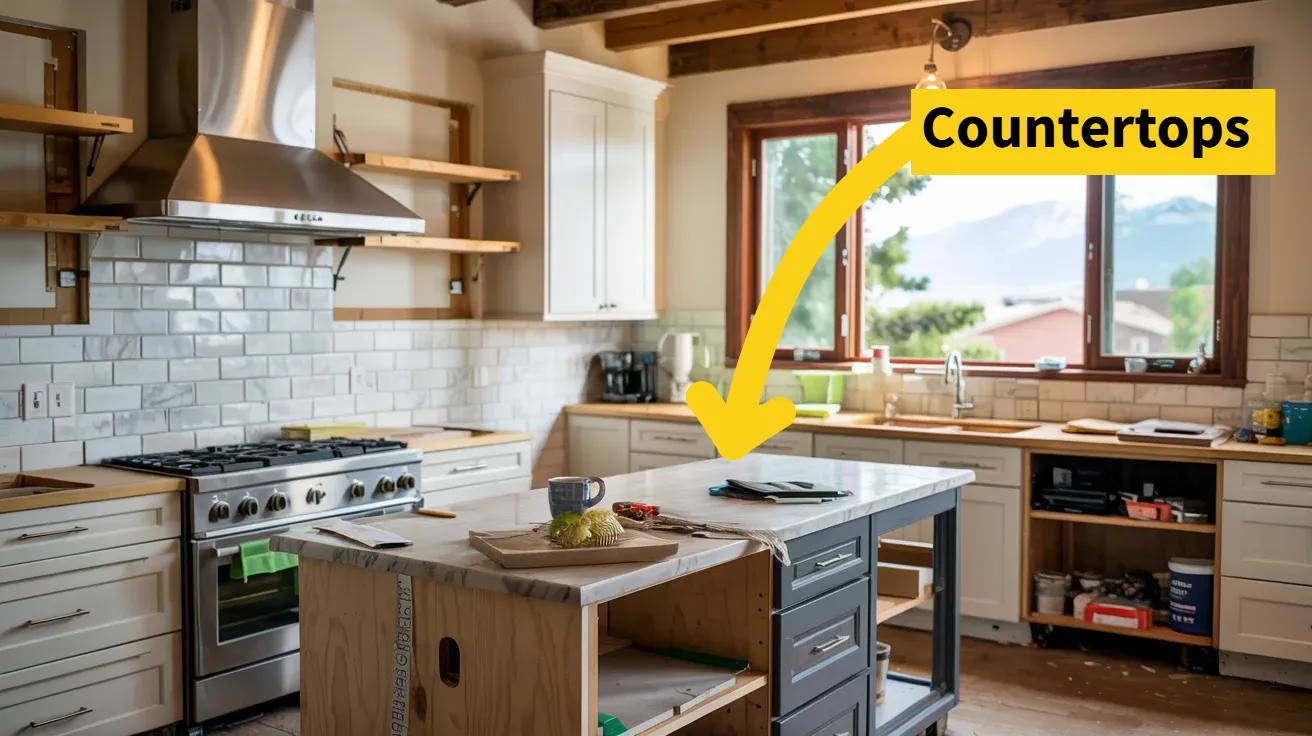
The countertop you choose will dramatically impact both your budget and how your kitchen looks and functions. Costs vary widely based on material, quality, and installation complexity. Here’s a breakdown of typical installed costs per square foot you’ll encounter in the Thornton/Denver market:
• Quartz: $50 – $130 per sq ft. Average costs often land between $70-$85/sq ft installed. Quartz offers durability, low maintenance, and a non-porous surface that resists stains without sealing.
• Granite: $40 – $200 per sq ft. Averages typically range from $70-$95/sq ft installed. Granite provides natural beauty, heat and scratch resistance when properly sealed. Regular sealing is crucial for stain resistance.
• Laminate: $19 – $45 per sq ft. Average installed cost around $34-$40/sq ft. This is your most budget-friendly option, available in many designs, resistant to stains and impact.
• Solid Surface (e.g., Corian): $35 – $100 per sq ft. Average installed cost around $56-$64/sq ft. Offers a seamless appearance but can be vulnerable to scratches and heat.
• Marble: $75 – $250 per sq ft. Average installed cost often $120+/sq ft. Prized for unique veining but is softer and more porous than granite, requiring careful maintenance.
• Other Natural Stone: Includes Quartzite ($75-$200/sq ft), Soapstone ($60-$150/sq ft), Limestone ($50-$90/sq ft), Slate ($60-$100/sq ft installed). Properties vary; quartzite is very durable, while soapstone and limestone are softer.
• Wood / Butcher Block: $40 – $50 per sq ft installed. Offers warmth but requires sealing and maintenance, especially around wet areas. Total project costs range from $1,200-$5,000.
• Tile: $15 – $20 per sq ft installed for standard tile. Grout lines require maintenance and can stain. Material cost can be as low as $5/sq ft.
• Concrete: $90 – $105 per sq ft installed. Offers industrial aesthetic, can be customized but requires sealing.
• Stainless Steel: $80 – $125 per sq ft installed. Hygienic, modern look, but can scratch and show fingerprints.
• Recycled Glass: $70 – $95 per sq ft installed. Eco-friendly option, often set in resin or concrete.
• Porcelain: $40 – $120 per sq ft installed. Durable, non-porous, can mimic stone looks effectively.
• Ultra Durable (Sintered Stone/Porcelain): $70 – $120 per sq ft installed. Extremely resistant to heat, scratches, and stains.
Industry standards provide benchmarks for countertop performance. Relevant American Society for Testing and Materials (ASTM) standards include ASTM C170 (Compressive Strength), ASTM C97 (Water Absorption), ASTM C880 (Flexural Strength), and ASTM C1028 (Static Coefficient of Friction/Slip Resistance).
The American National Standards Institute (ANSI)/Architectural Woodwork Institute (AWI) standard ANSI/AWI 1236-2022 addresses structural requirements, specifying resistance to a 50 lb load per 144 sq in with maximum 0.25″ deflection, standard overhangs between 0.5″ and 1.25″, and span support capable of handling a 200 lb point load with maximum 0.25″ deflection. For countertops incorporating wood elements, ASTM D1037 specifies testing for particleboard thickness as well.
The available data clearly illustrates a hierarchy among countertop materials, balancing cost against performance attributes like durability, maintenance requirements, and aesthetics.
Laminate and tile represent the most budget-conscious choices but generally offer lower durability (laminate surface wear) or higher maintenance (tile grout). Granite and quartz occupy a popular mid-to-high tier, providing a strong balance of durability, aesthetic appeal, and reasonable maintenance (especially quartz, being non-porous).
Materials like marble offer unique visual appeal but come at a higher cost and typically require more diligent care due to relative softness or porosity. Engineered materials such as solid surface provide specific benefits like seamless integration, while newer ultra-durable surfaces offer exceptional resistance to damage, each at distinct price points.
These trade-offs allow for material selection aligned with budget priorities, desired longevity, appearance goals, and tolerance for upkeep.
Comparison of Common Countertop Materials (Thornton/Denver Area Costs)
| Material | Average Installed Cost per Sq Ft ($ Range) | Key Characteristics | Relevant Standards |
|---|---|---|---|
| Granite | $70 – $95 | Natural stone, unique patterns, durable, heat/scratch resistant (sealed) | ASTM C170, C97, C880 |
| Quartz | $70 – $85 | Engineered stone, consistent patterns, very durable, low maintenance, non-porous | ASTM C170, C97, C880 |
| Laminate | $30 – $45 | Budget-friendly, wide design range, stain/impact resistant, less durable surface | N/A |
| Solid Surface | $55 – $65 | Seamless appearance, non-porous, repairable, less heat/scratch resistant | N/A |
| Marble | $120+ | Natural stone, unique veining, classic look, softer, porous, requires sealing | ASTM C170, C97, C880 |
| Wood/Butcher Block | $40 – $50 | Warm aesthetic, requires sealing/maintenance, can scratch/dent | ANSI/AWI 1236 (if wood) |
| Tile (Ceramic/Porcelain) | $15 – $20+ (plus higher labor) | Durable surface, water-resistant, grout requires maintenance | ASTM C1028 (slip) |
| Porcelain Slab | $40 – $120 | Durable, non-porous, heat/stain resistant, mimics stone | ASTM C170, C97, C880 |
(Note: Ranges are synthesized averages from local/national data; actual quotes may vary.)
Cabinet Materials
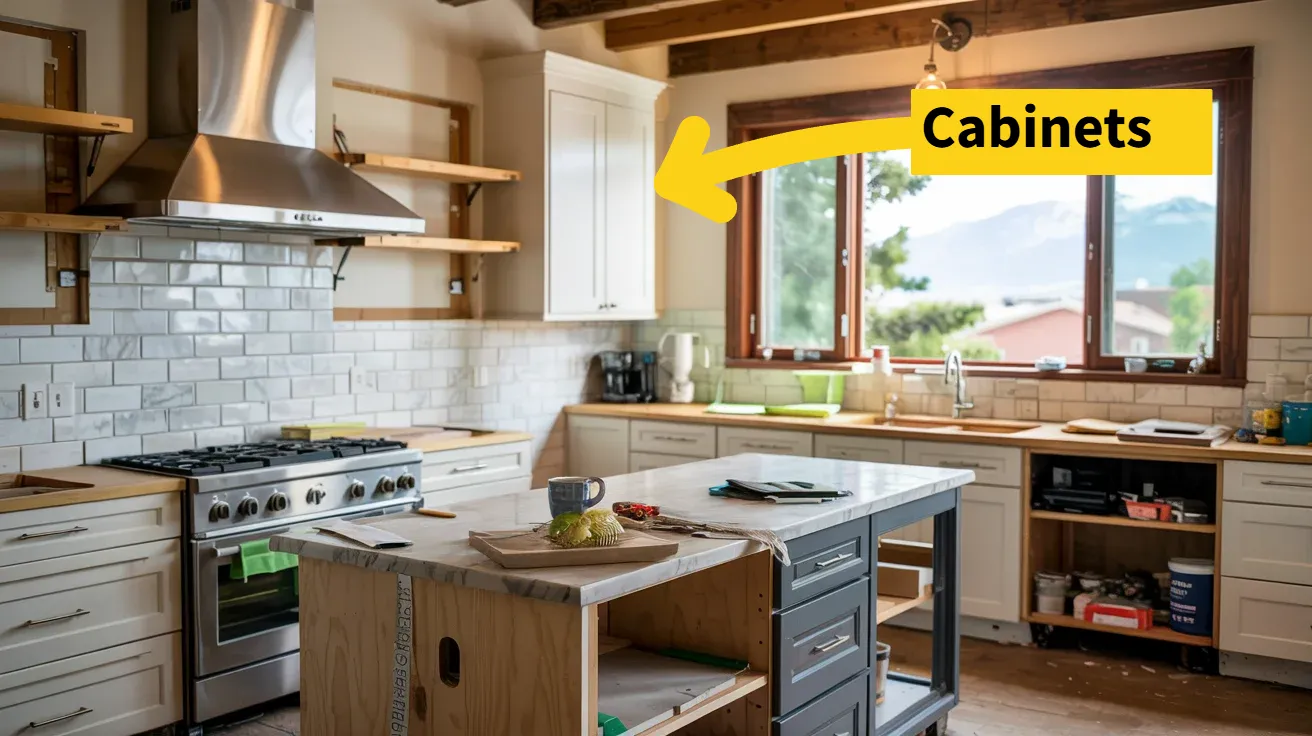
Cabinets typically represent the single largest investment in a kitchen remodel. Costs are primarily driven by construction type (stock, semi-custom, custom) and material choice. Prices are often quoted per linear foot (LF), encompassing both base and wall cabinets along a given wall length.
• Stock Cabinets: $100 – $300 per LF installed. These are mass-produced in standard sizes with limited style/finish options. They are the most affordable and readily available. Material costs alone are roughly $50-$100/LF.
• Semi-Custom Cabinets: $150 – $650 per LF installed. Offer more flexibility than stock in terms of sizes, finishes, storage options, and materials, providing a balance between cost and customization. Material costs alone range from $75-$400/LF. Some local providers start pricing around $1,000/LF.
• Custom Cabinets: $500 – $1,200 per LF installed (can exceed $1,500/LF). Built to specific dimensions and design requirements, offering maximum flexibility and potentially higher quality materials and construction. Material costs alone typically range from $300-$750/LF.
• Ready-to-Assemble (RTA): $600+ per LF. Shipped flat-packed for on-site assembly; can be a budget option if labor is DIY or lower cost. Often made from MDF or plywood. Total project cost $1,000-$8,000.
• Cabinet Refacing: $7,000 – $12,000 total project cost. Involves replacing doors/drawer fronts and veneering cabinet boxes. A cost-effective alternative if existing cabinet structures are sound, saving roughly one-third to one-half the cost of new cabinets.
Common materials used in cabinet construction include:
• Medium-Density Fiberboard (MDF): An engineered wood product, often used for doors (especially painted) or cabinet boxes. It provides a smooth surface for painting but is generally less durable and less water-resistant than plywood or solid wood. Custom MDF cabinets might cost $300-$400/LF installed.
• Plywood: Often used for cabinet boxes due to its structural stability and better moisture resistance compared to particle board or MDF.
• Solid Wood: Used for face frames, doors, and drawer fronts. Costs vary by species. Examples of custom installed costs per LF: Maple ($300-$400), Birch ($300-$400), White Oak ($400-$600), Cherry ($500-$700).
Performance and durability standards are crucial for cabinets. The ANSI/KCMA A161.1 standard is the primary benchmark in the industry. Cabinets certified to this standard have undergone rigorous third-party testing simulating years of use, covering:
Structural Integrity: Shelf and bottom loading (15 lbs/sq ft), wall cabinet mounting strength (up to 600 lbs), base joint strength.
Drawer Operation: Load cycling tests (e.g., 15 lbs/sq ft load for 25,000 cycles), drawer closing impact tests.
Door Operation: Swing tests (25,000 cycles), static load tests (65 lbs), hinge durability.
Finish Quality: Resistance to heat (120°F), cold (-5°F), humidity, and common household spills/stains (vinegar, juice, coffee, mustard, detergent).
The KCMA also offers a Severe Use standard (KCMA SU 2024) for cabinets intended for more demanding environments, featuring more rigorous testing protocols. Construction requirements within the standard address aspects like full enclosure, structural rigidity, material suitability for kitchen environments, and wood moisture content (≤10%).
The significant cost differences between stock, semi-custom, and custom cabinets reflect clear trade-offs. Stock cabinets provide affordability and quick availability but offer minimal flexibility in size, style, or finish, potentially leading to inefficient use of space or design compromises.
Custom cabinets provide complete design freedom and tailored sizing, ideal for unique spaces or specific aesthetic goals, but come at a substantial price premium, often three to five times the cost per linear foot of stock cabinets. Semi-custom cabinets occupy the middle ground, offering a wider range of modifications and better material options than stock, while remaining more affordable than fully custom work.
Cabinet refacing presents a distinct value proposition, offering a significant aesthetic upgrade at roughly half the cost of replacement, provided the existing cabinet boxes are structurally sound.
This tiered structure allows alignment of cabinet choices with budget constraints, functional needs, and design aspirations. Regardless of the cabinet tier chosen (stock, semi-custom, or custom), the emphasis placed on ANSI/KCMA A161.1 certification by industry associations and publications highlights its role as a crucial baseline indicator of quality and durability.
This certification, achieved through independent laboratory testing against established performance criteria, provides assurance that the cabinets meet minimum standards designed to withstand typical household use over many years. Specifying KCMA-certified cabinets is therefore a key quality control measure, ensuring a fundamental level of construction integrity, operational reliability, and finish resilience.
Comparison of Kitchen Cabinet Types (Thornton/Denver Area Costs)
| Cabinet Type | Average Installed Cost per Linear Foot ($ Range) | Key Characteristics | Relevant Standards |
|---|---|---|---|
| Stock | $100 – $300 | Pre-made, standard sizes, limited options, affordable | ANSI/KCMA A161.1 |
| Semi-Custom | $150 – $650 (or $1000+ locally) | Some customization (size, finish), better quality | ANSI/KCMA A161.1 |
| Custom | $500 – $1,200+ | Fully tailored design/size, premium materials, highest cost | ANSI/KCMA A161.1 |
| RTA | $600+ (plus assembly labor) | Flat-packed, requires assembly, budget potential | ANSI/KCMA A161.1 |
| Refacing | N/A (Project cost $7k-$12k) | Updates look of existing boxes, cost-effective vs. new | N/A |
(Note: Ranges synthesized from various sources. ANSI/KCMA certification applies if manufacturer seeks it.)
Flooring Materials
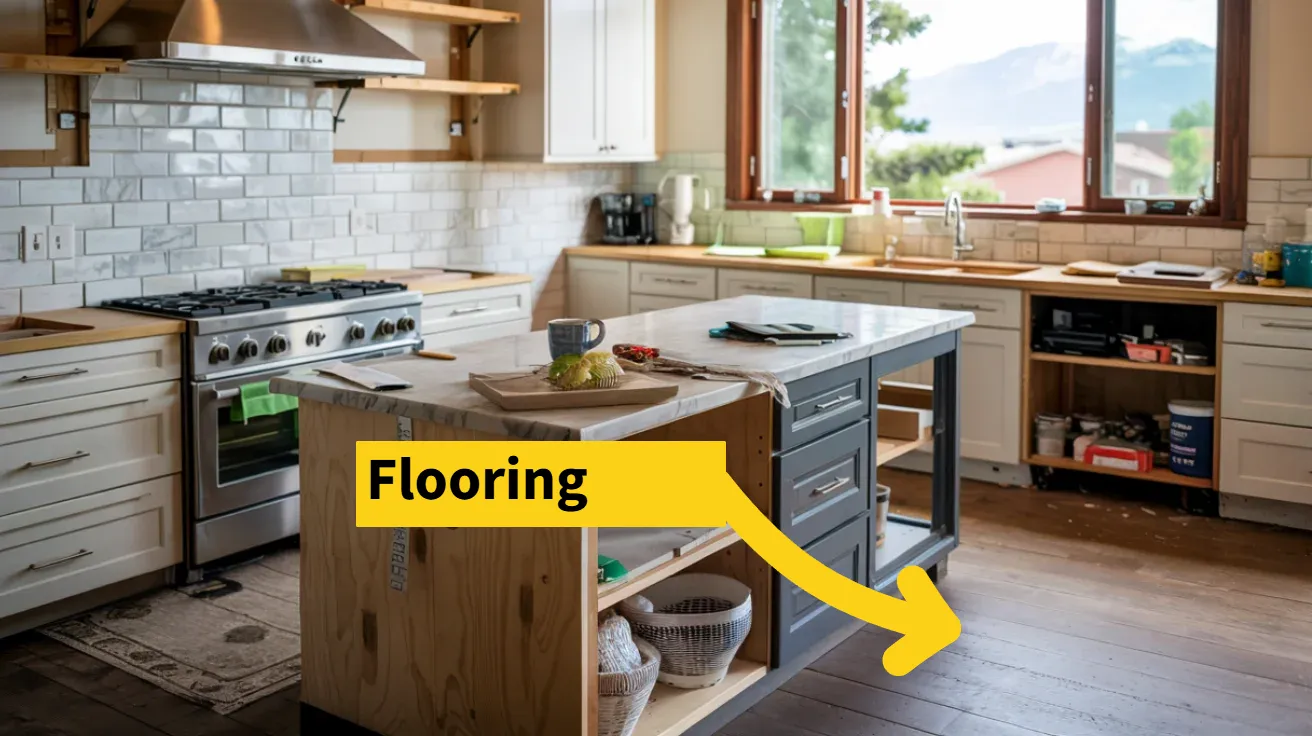
Kitchen flooring must balance durability, water resistance, maintenance, cost, and aesthetics. Costs per square foot installed vary significantly:
• Vinyl (Sheet/Tile/Plank): $2 – $10+ per sq ft. Sheet vinyl is typically the cheapest ($2-$7/sq ft installed), while standard planks and tiles fall within the broader range. Vinyl Composition Tile (VCT) material costs $1-$6/sq ft. Overall vinyl installation averages $2.50-$13.50/sq ft. Vinyl is generally durable and waterproof, making it suitable for kitchens.
• Luxury Vinyl (LVP/LVT): $4 – $16 per sq ft installed. Material costs range from $2-$10/sq ft. Offers enhanced thickness, durability, and often more realistic wood or tile visuals compared to standard vinyl. Also waterproof.
• Hardwood (Solid): $11 – $25 per sq ft installed. Denver-specific estimates for mid-grade solid hardwood installation are lower, around $6.76 – $9.48 per sq ft. Highly durable and long-lasting, can be refinished, but is susceptible to water damage, making it less ideal for kitchens without careful maintenance.
• Engineered Wood: $7 – $20 per sq ft installed. Denver estimates suggest $2.00-$3.25/sq ft installed for mid-grade. Offers wood look at lower cost than solid hardwood, potentially more stable, but limited refinishing capability. Still susceptible to water damage.
• Laminate: $4 – $14 per sq ft installed. Material costs $1-$10/sq ft. Provides wood or tile look affordably, generally scratch-resistant, but not recommended for high-moisture areas like kitchens due to potential core swelling.
• Tile (Ceramic/Porcelain): $10 – $50 per sq ft installed. Highly durable and water-resistant, making it an excellent choice for kitchens. Installation labor significantly increases the total cost compared to other options.
• Other Materials: Bamboo ($7-$17/sq ft), Linoleum ($3-$11/sq ft), Cork ($5-$15/sq ft), Concrete ($6-$12/sq ft) offer varying aesthetics and performance characteristics.
For rigid core flooring products, which include many LVP and LVT options, the ASTM F3261 standard provides performance specifications. This standard evaluates criteria such as surface integrity, dimensional stability, resistance to indentation, light, heat, chemical exposure, and static loads, ensuring a baseline level of quality and durability for these increasingly popular materials.
The flooring market shows a significant trend towards Luxury Vinyl Plank (LVP) and Luxury Vinyl Tile (LVT). These products command a higher price than basic sheet or tile vinyl but offer substantial improvements in durability, thickness, wear layer protection, and aesthetic realism, effectively mimicking the appearance of wood or stone.
Their inherent waterproof nature makes them particularly well-suited for kitchen environments where spills are common. The existence of specific industry standards like ASTM F3261 further solidifies their position as a reliable and high-performance flooring category. LVP/LVT effectively bridges the gap between lower-cost vinyl options and more expensive materials like hardwood or tile, offering a compelling balance of performance, appearance, and cost for modern kitchen remodels.
While ceramic and porcelain tile materials can be relatively affordable, especially for basic options, the total installed cost of tile flooring ($10-$50/sq ft) is considerably higher than that of vinyl ($2-$16/sq ft) or laminate ($4-14/sq ft). This disparity stems primarily from the labor-intensive nature of tile installation, which involves meticulous surface preparation, mortar application, precise setting, grouting,
and often sealing. Compared to the relatively simpler installation of click-lock or glue-down vinyl and laminate planks, tile setting demands more time and specialized skill, driving up labor costs.
Consequently, while tile offers excellent durability and water resistance, it represents a less budget-friendly option overall compared to floating floor systems like LVP or laminate.
Comparison of Common Kitchen Flooring Materials (Thornton/Denver Area Costs)
| Material | Average Installed Cost per Sq Ft ($ Range) | Key Characteristics | Relevant Standards |
|---|---|---|---|
| Luxury Vinyl (LVP/LVT) | $4 – $16 | Durable, waterproof, realistic visuals, moderate cost | ASTM F3261 |
| Hardwood (Solid) | $7 – $25 (Local avg $7-$10) | Very durable, long life, refinishable, water-sensitive | N/A |
| Engineered Wood | $7 – $20 (Local avg $2-$4) | Wood look, moderate cost, limited refinishing, water-sensitive | N/A |
| Laminate | $4 – $14 | Affordable, scratch-resistant, wood/tile look, moisture-sensitive core | N/A |
| Tile (Ceramic/Porcelain) | $10 – $50 | Very durable, waterproof, classic look, higher install cost | ASTM C1028 (slip) |
| Vinyl (Sheet/Standard) | $2 – $10 | Budget-friendly, waterproof, basic visuals/durability | N/A |
(Note: Ranges synthesized from various sources. ASTM F3261 applies to rigid core LVP/LVT.)
Material Availability in Thornton/Denver Area
Wondering if you’ll be able to find the materials you want in Thornton? Good news.
Common materials required for kitchen remodels, including cabinets, countertops, flooring, appliances, and fixtures, are readily available in the Thornton and greater Denver metropolitan area. The market is served by a diverse mix of suppliers.
These include specialized kitchen and bath showrooms that often feature higher-end products, custom options, and integrated design services. Large home improvement retailers like Lowe’s and Home Depot provide broad accessibility to standard materials and appliances across various price points.
Additionally, local building contractors and remodelers typically maintain established relationships with wholesale distributors and suppliers. Some commercial restaurant supply stores in Denver may also offer durable fixtures or equipment suitable for residential use.
This mix of specialized showrooms and large retailers provides consumers with a spectrum of choices. Showrooms often cater to clients seeking unique, high-end, or fully custom materials and typically offer dedicated design consultation, potentially leading to a more curated but higher-cost project.
Big-box stores, conversely, offer convenience, readily available stock items, and competitive pricing on standard materials, appealing to budget-conscious consumers or those undertaking more straightforward renovations.
This diverse supplier landscape ensures that materials fitting various budgets, styles, and quality requirements are accessible within the Thornton/Denver region.
Labor Costs in the Thornton Region
General Contractor Rates
Ever wonder what your general contractor (GC) actually costs? These professionals play the crucial role of quarterback for your kitchen remodel—coordinating subcontractors, managing schedules, and overseeing the entire execution. Their compensation structure significantly impacts your bottom line.
The most common payment structure? A percentage fee based on your total project cost, typically ranging from 10% to 20%.
Less commonly, particularly for smaller projects or pre-construction consulting, GCs may charge hourly or daily rates.
Hourly rates for GCs, when applied, generally fall between $50 and $150 per hour nationally. Local data for the Denver area suggests ranges from $30-$85/hr, $80-$150/hr, or an average around $42/hr based on salary survey data. Daily rates are estimated between $300 and $500.
For a typical kitchen remodel, the percentage-based fee (10-20%) is standard practice. This structure means the GC’s compensation is directly tied to your overall spending on materials, appliances, and subcontractor labor.
Here’s what that means for your budget: choices that increase the project’s base cost, such as selecting premium materials or expanding the scope of work, will also proportionally increase the GC’s fee.
While this model incentivizes the GC to manage the project effectively to control costs (as their fee is a percentage), it also means homeowners should be aware that higher-end selections inherently inflate the management overhead cost.
Hourly or fixed-fee arrangements might be negotiated for specific, well-defined scopes but are less common for the variable nature of a full remodel.
Trade-Specific Hourly Rates
Kitchen remodels require the expertise of various skilled tradespeople. Estimating their labor costs involves understanding typical hourly rates, though the rate charged to you (billing rate) often differs significantly from the wage paid to the employee.
• Plumbers: Payroll data indicates an average wage of approximately $36.20/hr for construction plumbers in Colorado, with the Thornton-specific average at $35.20/hr. The typical wage range (25th-75th percentile) is $27-$40/hr. However, billing rates charged to homeowners are generally higher, often cited in the $50-$100/hr range nationally for plumbers.
• Electricians: Average wages for licensed electricians in Thornton are reported around $34.84/hr, with a typical range of $28-$40/hr. Other sources suggest average Thornton wages near $32.50/hr. However, homeowner billing rates are consistently cited much higher: $50-$100/hr, $40-$150/hr in Colorado, $50-$130/hr nationally (with higher rates for master electricians), $50-$100/hr nationally.
• Tilers: Statewide average wage for tilers in Colorado is around $24.81/hr, with a typical range of $20-$28/hr. The Denver average is $24.29/hr. National data for tile contractors suggests a higher median billing rate around $44/hr, with a typical range of $33-$51/hr.
• Other Labor: Cabinet installers may charge $50-$450 per linear foot, depending on complexity. General laborers or helpers might cost $40-$50/hr or $150-$250 per day.
A significant distinction exists between the average wages reported in salary surveys (like ZipRecruiter), which reflect employee compensation, and the hourly billing rates quoted by contractors or cost estimating guides.
The billing rates ($50-150/hr range often cited for electricians/plumbers) represent the price charged to the customer. This rate incorporates not only the direct labor wage but also the contractor’s overhead (insurance, vehicle costs, tools, office expenses), profit margin, and potentially benefits contributions.
Homeowners must budget based on these higher billing rate ranges, as they reflect the actual cost of securing professional trade services for their remodel.
Estimated Hourly Labor Rates for Kitchen Remodel Trades (Thornton/Denver Area Billing Rates)
| Trade | Typical Billing Rate Range ($/hour or other) | Notes |
|---|---|---|
| General Contractor | 10% – 20% of Project Cost (or $50 – $150/hr) | Percentage fee is most common for full remodels |
| Plumber | $50 – $150 / hour | Billing rate includes overhead/profit; wages average ~$35-36/hr |
| Electrician | $50 – $150 / hour | Billing rate includes overhead/profit; wages average ~$35/hr; Master rates higher |
| Tiler | $35 – $60+ / hour | Billing rate includes overhead/profit; wages average ~$25/hr |
| Cabinet Installer | $50 – $450 / Linear Foot | Rate varies significantly with cabinet type and complexity |
| General Laborer | $40 – $60 / hour | For helpers, demolition, cleanup, etc. |
(Note: Billing rates are estimates based on cited ranges and the distinction from wage data.)
Thornton Permitting and Regulations
Permit Requirements and Process
Think you can just start knocking down walls and rerouting plumbing? Not so fast. Navigating local regulations is a critical aspect of planning a kitchen remodel in Thornton.
The City of Thornton requires a building permit for virtually any work involving erecting, constructing, enlarging, remodeling, altering, repairing, improving, removing, converting, or changing the occupancy of a building, structure, or utility.
This broad definition encompasses typical kitchen remodel activities. While homeowners performing work on their own primary residence are exempt from contractor licensing requirements, any hired contractors must hold the appropriate City of Thornton license.
The permitting process typically involves:
- Application Submittal: Plans and supporting documents are submitted electronically via the CityView Portal. The complexity of your project dictates the level of detail required in the plans.
- Plan Review: City staff review the submitted plans for compliance with adopted codes. Estimated review times vary; residential remodels typically take around 8 working days, though delays can occur.
- Fee Payment: Permit fees, plan review fees, use tax, and any applicable trade-specific fees must be paid (detailed below).
- Permit Issuance: Once plans are approved and fees are paid, the building permit is issued.
- Inspections: Inspections are required at various stages of construction (e.g., rough-in plumbing, electrical, framing; final inspection). For occupied homes, inspections may be conducted in person or virtually (via video call using FaceTime or Google Meets), depending on homeowner comfort and inspector discretion.
Given the comprehensive language defining work that requires a permit (“remodel, alter, repair, improve…”), it’s highly probable that almost any kitchen remodel extending beyond purely cosmetic updates (like painting existing cabinets without moving fixtures or wiring) will necessitate a building permit in Thornton.
This is especially true if any plumbing, electrical, or structural elements are modified, which is common in kitchen renovations. Projects involving layout changes explicitly trigger permit requirements.
Homeowners should operate under the assumption that a permit is required for their project and confirm specific requirements with the Building Inspection Division early in the planning phase.
Permit Fees and Calculation
The cost of obtaining a building permit in Thornton is multi-faceted and based primarily on the project’s total valuation. For remodels, valuation is determined by adding the cost of labor and materials, or alternatively, by multiplying the total material cost by two.
The Building Permit Fee itself is calculated using a tiered schedule based on this valuation.
In addition to the base permit fee, several other costs apply:
• Plan Review Fee: Calculated as 65% of the Building Permit Fee.
• Use Tax: Levied at a rate of 3.75%. This tax is calculated on either 50% of the project’s total valuation OR 100% of the total material cost, whichever method is applicable per city policy.
• Trade Fees: If the remodel includes plumbing, mechanical, or electrical work (as most kitchen remodels do), separate fees based on the valuation of work for each trade will be assessed.
• Other Fees: Potential additional costs include reinspection fees ($75 if an inspection fails) and significant penalties for performing work without a required permit (an investigation fee equal to the building permit fee, effectively doubling the cost).
The total cost of permitting extends significantly beyond the base fee derived from the valuation schedule. Budgeting must account for the substantial Plan Review Fee (65% of the base fee), Use Tax (3.75%), and applicable trade permits.
City of Thornton Building Permit Fee Schedule (Based on Project Valuation)
| Total Valuation Range ($) | Permit Fee Calculation |
|---|---|
| $1.00 – $500 | $30.00 |
| $501 – $2,000 | $30.00 for the first $500 plus $3.15 for each additional $100 or fraction thereof |
Source: City of Thornton (Effective Jan 1, 2025)
Additional Costs: • Plan Review Fee = 65% of Building Permit Fee • Use Tax = 3.75% of (50% Valuation OR 100% Material Cost) • Fees for included Plumbing, Mechanical, Electrical work based on trade valuation. • Reinspection Fee = $75.00 • Work Without Permit Penalty = Equal to Building Permit Fee ($75.00 Minimum)
Applicable Building Codes
All construction work performed under a permit in Thornton must comply with the city’s adopted building codes. As of June 1, 2023, the relevant codes for residential kitchen remodels include:
- 2021 International Residential Code (IRC)
- 2021 International Building Code (IBC) – Applicable for structural elements or if part of a multi-family dwelling.
- 2021 International Plumbing Code (IPC)
- 2021 International Mechanical Code (IMC)
- 2021 International Fuel Gas Code (IFGC)
- 2021 International Existing Building Code (IEBC)
- 2021 International Energy Conservation Code (IECC)
- 2020 National Electric Code (NEC)
- 2021 Thornton Fire Code Amendments
The adoption of the 2021 International Existing Building Code (IEBC) holds particular significance for remodeling projects. The IEBC provides specific regulations and compliance paths tailored for alterations, additions, and repairs to existing structures.
Unlike applying new construction codes (IRC/IBC) directly, the IEBC often offers more flexibility or alternative methods for addressing existing conditions encountered during a remodel.
Compliance requirements under the IEBC can influence decisions regarding the extent of upgrades needed for existing systems (like electrical wiring or plumbing lines not directly part of the planned scope), thereby potentially impacting the overall project complexity and cost.
Understanding the provisions of the IEBC is beneficial when planning renovations in existing homes.
Building Inspection Division Contact Information
For inquiries regarding permits, inspections, codes, and contractor licensing related to kitchen remodels in Thornton, the primary point of contact is the Building Inspection Division.
City of Thornton Contact Information for Kitchen Remodels
| Department/Purpose | Contact Method | Specific Contact Info |
|---|---|---|
| Building Permits & Inspections | Phone | 303-538-7250 |
| [email protected] | ||
| Address | 9500 Civic Center Drive, Thornton, CO 80229 | |
| Inspection Scheduling | Phone | 303-538-7396 (General) / 303-538-7430 (Roofing Only) |
| Online | CityView Portal (registration required) | |
| City Development (General) | Phone | 303-538-7295 |
| [email protected] | ||
| Utility Billing (Water/Sewer Fees) | Phone | 303-538-7370 |
| [email protected] | ||
| Fire Prevention | Phone | 303-538-7007 |
| [email protected] |
Return on Investment (ROI) Analysis
Typical ROI Ranges for Kitchen Remodels (Denver/Mountain Region)
Will your kitchen investment pay off when it’s time to sell? Return on investment (ROI), or the percentage of remodeling costs recouped upon resale, is a key consideration for many homeowners.
Data, primarily from Remodeling Magazine’s annual Cost vs. Value Report, indicates that ROI varies substantially based on the scope of the kitchen remodel.
Minor Midrange Kitchen Remodel: This category consistently shows the highest ROI. The 2024 Cost vs. Value report indicates a national average ROI of 96.1%. For the Mountain region (which includes Colorado), the ROI was reported at 94.3%. Denver-specific analyses citing this report place the ROI between 96.1% and 97.4%. Older data points suggested lower ROIs historically, ranging from 60-80% or around 71-77%, but recent years show exceptionally high returns for well-executed minor updates.
Major Midrange Kitchen Remodel: This involves more extensive work and yields a lower ROI. The 2024 national average ROI is 49.5%, with the Mountain region at 51.3%. One Denver analysis cited 49.5%, while another mentioned 74.8%, though the latter figure appears inconsistent with the primary Cost vs. Value data source. An older report cited 56% ROI for a major remodel.
Major Upscale Kitchen Remodel: Incorporating high-end materials and potentially complex design changes results in the lowest percentage return. The 2024 national and Mountain region ROI is 38.0%. Denver-specific analyses align with this figure.
Based on the consistent data from the 2024 Cost vs. Value report, homeowners in the Thornton/Denver area can expect a minor midrange kitchen remodel to recoup approximately 94-96% of its cost at resale. A major midrange project typically returns around 50-51%, while a major upscale renovation yields about 38%.
The consistent finding across multiple reports and years is that minor, cost-effective kitchen updates provide a significantly higher percentage return on investment compared to extensive major or luxury renovations.
While larger-scale remodels undoubtedly add more absolute dollar value to a home’s resale price, their substantially higher initial cost means that a much smaller fraction of that investment is recovered.
Minor remodels achieve high ROI by focusing on high-visibility, high-impact upgrades like refreshing cabinet fronts (painting or refacing), installing new countertops and hardware, and replacing appliances, typically without undertaking costly and disruptive structural changes like altering the layout.
Market data suggests that while buyers strongly value updated kitchens, they may be unwilling to pay a large premium for highly personalized or excessively expensive renovations that deviate significantly from prevailing tastes or market norms.
This implies that for maximizing the financial return, targeted cosmetic and functional upgrades are generally more effective than comprehensive, high-cost overhauls.
Although absolute remodeling costs can differ significantly by geographic location, the fundamental pattern of ROI (Minor Remodel > Midrange Remodel > Upscale Remodel) appears remarkably consistent across regions. This is evidenced by the close alignment between the ROI percentages reported for the Mountain region and the national averages in the 2024 Cost vs. Value data for all three kitchen remodel categories.
This consistency suggests that the underlying market dynamics influencing ROI—such as buyer preferences for updated spaces, the cost-effectiveness of various upgrade types, and the diminishing returns of luxury spending—are broadly similar nationwide, even if the specific dollar amounts involved vary.
Factors Influencing ROI in the Thornton Market
Several factors influence the actual ROI achieved from a kitchen remodel in the Thornton market:
Project Scope: As established, minor remodels focusing on cosmetic updates yield higher ROI than major renovations involving structural changes. Avoiding layout alterations is key to controlling costs and maximizing returns.
Material Quality and Style: Selecting midrange materials often provides the best ROI balance. Popular choices like quartz countertops and energy-efficient stainless steel appliances align well with minor and midrange projects that perform well in resale. Overspending on luxury materials typically diminishes the percentage return. Choosing broadly appealing, modern, and neutral aesthetics can enhance marketability. Some data suggests specific paint colors (light blue/soft gray) may correlate with higher sale prices.
Budget Alignment: A common guideline suggests spending between 5% and 15% of the home’s total value on the kitchen remodel to optimize ROI, ensuring the investment is proportional to the property’s worth.
Execution Quality: Professional installation ensures durability and avoids costly mistakes that can detract from value. While skilled DIY can save on labor costs, poor execution can negatively impact ROI.
Market Conditions: Updated kitchens are a strong selling point and can help a home sell faster in a competitive market like Denver’s.
Contingency Planning: Allocating 10% to 20% of the budget for unforeseen issues (e.g., hidden water damage, unexpected electrical problems) prevents budget overruns that can erode potential returns.
Maximizing ROI in Thornton involves a strategic approach: focus on cost-effective upgrades with high visual impact (minor to midrange scope), select materials that are appealing and durable but avoid excessive luxury, maintain the existing layout if feasible to control costs, and align the overall budget appropriately with the home’s market value.
The data points towards an ROI “sweet spot” for kitchen remodels. This involves undertaking renovations significant enough to modernize the space, enhance functionality, and appeal strongly to potential buyers, while consciously avoiding major structural alterations or ultra-luxury finishes that inflate costs beyond proportional market value increases.
Key elements within this sweet spot often include updating cabinet appearances through refacing or painting, replacing worn countertops with popular and durable mid-range options like quartz, installing new, energy-efficient appliances, and refreshing flooring and lighting.
These targeted upgrades address the most visible and functional aspects of the kitchen, delivering a perception of significant improvement without the extreme costs associated with gut renovations or high-end customization, thereby aligning with the projects demonstrating the highest ROI percentages. The 5-15% of home value guideline reinforces this concept of proportionate investment.
Return on Investment (ROI) for Kitchen Remodels (Mountain Region/National)
| Remodel Scope | Average Job Cost ($) | Average Resale Value Added ($) | Cost Recouped (ROI %) | Key Factors for Maximizing ROI |
|---|---|---|---|---|
| Minor Midrange | $26,586 – $27,492 | $25,077 – $26,406 | 94.3% – 96.1% | Focus on cosmetic updates (cabinet refacing/paint, hardware), new mid-range countertops/appliances, keep existing layout. |
| Major Midrange | $76,374 – $79,982 | $39,214 – $39,587 | 49.5% – 51.3% | Balance upgrades with cost; semi-custom cabinets, quality appliances/countertops. ROI lower due to higher cost. |
| Major Upscale | $150,172 – $158,530 | $57,017 – $60,176 | 38.0% | Lowest ROI due to high cost of luxury materials, custom work, potential layout changes. Driven by lifestyle over ROI. |
Source: Remodeling Magazine Cost vs. Value Report 2024 (Mountain Region & National Averages). Denver-specific ROI cited aligns closely.
Conclusion
Kitchen remodels in Thornton come with a price tag that reflects your ambition: $13,000-$30,000 for basic refreshes, $30,000-$80,000 for mid-range overhauls, or $80,000+ for custom transformations.
The biggest budget bites? Cabinets and labor, claiming nearly half your total spend.
When it comes to recouping your investment, focus matters more than luxury. Minor updates deliver an impressive 94-96% ROI, while high-end renovations return just 38% of what you’ll spend.
The smartest approach? Keep your budget between 5-15% of your home’s value, prioritize visible upgrades over layout changes, and don’t skip permits—they’re non-negotiable for most meaningful work in Thornton.
